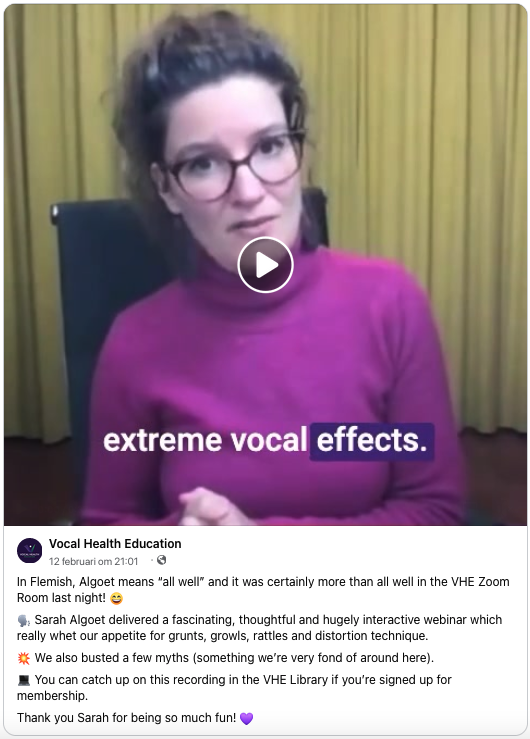Add-on & Guest webinars

Welcome to a series of enriching webinars where we delve deeper into the subjects covered in The singsing! Fundamentals, while also introducing new topics. This part of the Library keeps on growing endlessly!
Some webinars are led by me, but I also invite guest teachers who are leading experts on the voice, performance and much more.
Scroll down and discover all the subjects, previews, feedback from participants, blog posts and quizzes based on the webinars 👇🏼
Is It Safe to Sing? Brain-Based Exercises for More Ease, Stability, and Efficiency in Your Voice by Bjorn Poels

Watch this 2 hour webinar (recorded in February ’25) and discover the full potential of your voice with cutting-edge brain-based exercises designed to improve your singing with ease, stability, and efficiency, especially if you’re hypermobile.
This practical webinar, led by Bjorn Poels, Z-Health certified Performance Trainer, will transform the way you think about and experience your voice.
You will hack your (hypermobile) brain with proprioceptive, vestibular, and visual exercises; and experience the effect immediately on your singing!
 Did You Know?
Did You Know?
- Your brain controls every aspect of your body, including your voice. By improving brain-body communication with proprioceptive, vestibular, and visual exercises, you can tap into new levels of vocal performance.
- A well-functioning vestibular system and sharp visual awareness are crucial for your postural stability, breath management, and vocal freedom.
- Simple, targeted exercises can instantly reduce tension in targeted regions, improving your vocal resonance and ease.
- Assessing and addressing your body’s unique needs can lead to breakthroughs in stability, efficiency, and confidence.
—————————————————————-
What You Will Learn
In this highly practical webinar, you will:
- Discover the Magic of Brain-Based Training: Experience firsthand how targeted exercises can improve vocal performance and reduce tension immediately.
- Assess and Improve: Learn simple assessments to identify areas of weakness or instability in your body and how they impact your singing.
- Boost Your Stability and Ease: Explore exercises designed to stabilize your posture, improve your breath management, and enhance your vocal efficiency.
- Gain Tools for Continued Growth: Walk away with actionable exercises and techniques to practice at home, helping you achieve long-term improvement in your singing.
- Feel the Difference: Combine exercises with real-time singing assessments to experience noticeable changes in your voice during the webinar itself.
—————————————————————-

What Makes This Webinar Unique?
Unlike traditional vocal training, this webinar focuses on brain-based techniques that tap into the power of your nervous system to optimize your singing. By combining simple assessments with targeted exercises, you’ll experience immediate improvements and gain a deeper understanding of how your brain and body work together to support your voice. Plus, since you’ll receive pre-webinar resources like blog posts and videos, we can focus entirely on practical application during the session, maximizing your results.
—————————————————————-
Who Should Attend?
This webinar is perfect for:
- Singers of all levels who want to improve their vocal performance.
- Voice teachers looking for innovative techniques to help their students.
- (Voice teachers who work with) hypermobile people wanting to navigate their bodies’ and voices’ unique challenges.
- Anyone curious about the intersection of neuroscience and vocal training.

With a pedagogical diploma in hand at the age of 22 in 1999, Bjorn Poels from Care4Physics was consistently drawn to the medical and paramedical fields.
In 2008, he took his first steps in the world of healthcare and wellbeing by completing his training as a sports care giver. That same year, an exciting opportunity arose when he started working for the professional Belgian football club KRC Genk. From 2008 to 2018, Bjorn worked at the highest level, supporting both youth and senior football players.
Starting in 2012, Bjorn expanded his expertise by pursuing various certifications, including:
- Personal Trainer
- Corrective Exercise Specialist
- Functional Kinesiology Communication Therapist
- Rehab Coach
- Program Design Coach (tailored strength programs)
- Analytical Brain-Based Trainer at the American Z-Health Performance Solutions
 Through treatments focused on breathing techniques, proprioceptive, vestibular, and visual exercises, Bjorn helps his clients address blind spots and hidden challenges.
Through treatments focused on breathing techniques, proprioceptive, vestibular, and visual exercises, Bjorn helps his clients address blind spots and hidden challenges.
Bjorn says:
“The brain has an incredible ability to adapt to new situations and can be influenced! Neuroplasticity principles can help you move better, pain-free and with greater fluidity, ultimately improving your quality of life. Finding the root cause of your symptoms is my mission.”
What You Should Know About the Sometimes Unexpected Effects of Medications on Your Voice by dr. Lieve Delsupehe

Are your vocal folds paying the price for medications you thought were harmless? Watch this 1,5h webinar led by phoniatrician – laryngologist Dr. Lieve Delsupehe (recorded in January ’25) and discover the surprising ways everyday medications can affect your most precious asset, your voice.
We’re not only going to talk about how to avoid pitfalls. We’ll help you understand how to safeguard your voice and overall health in an era where medications are part of daily life.
Whether you’re a singer, a voice teacher, or someone who appreciates speaking comfortably, this webinar will equip you with the insights you need to stay in control of your voice and overall health.
Did you know…



What You’ll Learn:




—————————————————————-
 Lieve Delsupehe, Ear-Nose-Throat (ENT) doctor at the AZ Delta hospital in Roeselare, followed her education at the KUL and UZ Leuven where she graduated as a ENT specialist in 1994. She then did a fellowship at the University of Chicago and was trained by Prof.Dr.R.W.Bastian at the Loyola University Chicago. Bob Bastian is an absolute world authority who passed on his passion for voice, both speaking voice and professional singing voice.
Lieve Delsupehe, Ear-Nose-Throat (ENT) doctor at the AZ Delta hospital in Roeselare, followed her education at the KUL and UZ Leuven where she graduated as a ENT specialist in 1994. She then did a fellowship at the University of Chicago and was trained by Prof.Dr.R.W.Bastian at the Loyola University Chicago. Bob Bastian is an absolute world authority who passed on his passion for voice, both speaking voice and professional singing voice.
After her fellowship, she stayed at UZ Leuven as a phoniatrics consultant for 10 years. She followed various advanced training in voice pathology and surgery.
In her spare time she took singing lessons with soprano Hilde Coppé and obtained a diploma flute. In addition to her passion for music and voice, she is an enthusiastic photographer. Currently she is conducting De Stemkliniek (The Voice Clinic) at AZ Delta in Roeselare.

Célia Cazenna, Singer and Voice Teacher
Célia Cazenna, Singer and Voice Teacher


Stella Handley, Vocational singer
Stella Handley, Vocational singer

The Voice in the Menopause Transition and Beyond by Joanne Hayes Bozeman

Watch this 1,5h webinar (recorded in November ’24) and learn all there is to know about how the menopause transition can effect the voice!
The menopause transition is receiving more attention as of late – a good thing! But for singers, one piece of information is missing, and that is that the singing voice can be impacted by the hormonal shift during perimenopause or after.
We will cover menopause basics, possible related voice changes, and how to manage them if they occur.
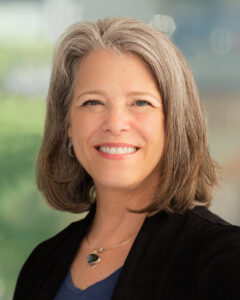 A graduate of the University of Arizona, Joanne Bozeman has been a singing teacher for nearly 50 years. Her teachers include Richard Miller, Eugene T. Conley, Bruce Lunkley, and Teresa Seidl. In 1993, she joined the faculty of Lawrence University’s Conservatory of Music in Wisconsin, where she taught singing and a number of voice-related, diction and music education courses until her retirement in 2019. Her students have gone on to select graduate schools, young artist programs and singing careers. Others are music educators, university and community-based voice teachers, and speech-language pathologists. In addition to her career as a singing teacher, Joanne was an actively performing soprano, and she served voice trainer for the Lawrence Community Girl Choir program.
A graduate of the University of Arizona, Joanne Bozeman has been a singing teacher for nearly 50 years. Her teachers include Richard Miller, Eugene T. Conley, Bruce Lunkley, and Teresa Seidl. In 1993, she joined the faculty of Lawrence University’s Conservatory of Music in Wisconsin, where she taught singing and a number of voice-related, diction and music education courses until her retirement in 2019. Her students have gone on to select graduate schools, young artist programs and singing careers. Others are music educators, university and community-based voice teachers, and speech-language pathologists. In addition to her career as a singing teacher, Joanne was an actively performing soprano, and she served voice trainer for the Lawrence Community Girl Choir program. Inspired by her long-standing interest in voice health and the relationship of hormones with voice throughout the female lifespan, Joanne co-authored the book Singing Through Change: Women’s Voices in Midlife, Menopause, and Beyond, released in 2020. She has spoken on the subject of female voice and hormones for many organizations, including the International Congress of Voice Teachers (ICVT), the Association of Teachers of Singing (AOTOS), the British Voice Association, (BVA), the National Association of Teachers of Singing (NATS), the Pan American Vocology Association (PAVA), the Physiology and Acoustics of Singing Conference (PAS), and numerous universities and voice collectives.
Inspired by her long-standing interest in voice health and the relationship of hormones with voice throughout the female lifespan, Joanne co-authored the book Singing Through Change: Women’s Voices in Midlife, Menopause, and Beyond, released in 2020. She has spoken on the subject of female voice and hormones for many organizations, including the International Congress of Voice Teachers (ICVT), the Association of Teachers of Singing (AOTOS), the British Voice Association, (BVA), the National Association of Teachers of Singing (NATS), the Pan American Vocology Association (PAVA), the Physiology and Acoustics of Singing Conference (PAS), and numerous universities and voice collectives.
Her professional memberships include PAVA and NATS. Joanne serves as a course tutor and specialist with the Voice Care Centre in Great Britain, and is co-author of a chapter on female voice and hormones in the forthcoming Oxford Handbook of Voice Pedagogy. She also presents on her secondary topic of interest, hypermobility, Ehlers-Danlos Syndrome with Hypermobility and POTS (Postural Orthostatic Tachycardia Syndrome), and how these frequently overlapping conditions may affect singers.
As a young mother, Joanne was a certified prenatal and childbirth educator, which formed the foundation of her lifelong passion for health advocacy for women, and of her interest in the effects of the hormonal landscape on female singing voice. Retired from academia and professional performance, Joanne continues to be engaged with the voice community as a teacher, presenter, and choral singer.
Watch Joanne explain what we’re going to be talking about and what leading voice experts have to say about her! 👇🏼

Joanne has given me concrete, actionable information, and suddently it all seems much more manageable, I see a way forward. I feel reassured, informed and empowered.
Vocational singer
Vocational singer


Stella Handley, Vocational singer
Stella Handley, Vocational singer

The Tongue, Lips & Jaw Gym by Emily Kirkcaldy

Restricted tongue mobility can severely impact your singing. Even slight restrictions can make a significant difference in your ability to control your voice. It can have an effect on jaw tension, breathing and vocal range, leading to a struggle with intonation, dynamics, resonance, vocal agility, and much more.
But there’s good news! You can train your lips, soft palate, jaw ànd tongue. That’s exactly what you’re going to do in this 1,5h fun, interactive webinar (recorded in October ’24) led by myofunctional therapist Emily Kirkcaldy.
Emily guides you through a selection of fun and practical myofunctional exercises for the lips, soft palate, jaw and tongue. These exercises can be used to increase oral tone and encourage optimal tongue posture and breathing. You can pick them up anywhere, as part of your daily routine, to target a particular area, or generically, in your vocal warm-ups.
 A few of the exercises require some tools from around the house. If possible, try to gather:
A few of the exercises require some tools from around the house. If possible, try to gather:
- 2 wine corks
- A ball of parcel string (and bring some scissors)
- A large button (around 2.5-3 cm diameter) with holes big enough to thread string through.
- A balloon
The Tongue, Lips & Jaw Gym is for people with ànd without tongue ties!
Everybody will benefit from these exercises in a myriad of ways.
Emily Kirkcaldy (UK) is a Specialist Speech and Language Therapist and Orofacial Myofunctional Therapist. She’s the owner and lead clinician at Breathe First with over 20 years of experience in SALT, AOMT & Buteyko Breathing.
Emily has 20 years of experience as a Speech and Language Therapist, and has spent the last 4 years working as an Orofacial Myofunctional Therapist and Breathing Practitioner, supporting her patients to achieve their goals of improved breathing, oral function and oral rest posture, to support a variety of symptoms; from sleep disordered breathing to jaw pain and vocal tension. Emily works with many tongue tied patients, including many professional voice users.
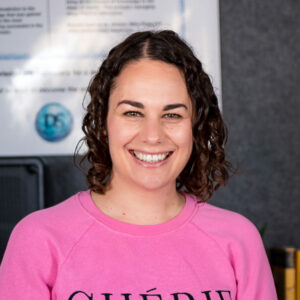
Gemma Milburn - UK based Singer and Vocal Coach - Takes voice lessons with Sarah Algoet and has completed Myofunctional Therapy with Emily Kirkcaldy
Gemma Milburn - UK based Singer and Vocal Coach - Takes voice lessons with Sarah Algoet and has completed Myofunctional Therapy with Emily Kirkcaldy

Pop Vocal Riffs & Runs by Kim Chandler

Watch this 1,5h fun, interactive webinar (recorded in July ’24) and learn how to sing a variety of stylistic embellishments – aka licks, riffs and runs.
The amazing Kim Chandler will take you through a variety of stylistic embellishments with increasing levels of complexity and taken from a range of sources. Some are generic patterns and others are “harvested” directly from pop repertoire, but all serve the purpose of building good vocal agility (technique) and a good ear (musicianship).
Kim Chandler: As with every field, there are people who are just naturally good at ad- libbing and don’t need to work on it. However, for others, practicing ad-libbing can form part of a regular vocal practice program and also be included in vocal coaching sessions.
 Kim Chandler is a renowned CCM vocal coach & session singer based in Spain. Considered one of the “go to” industry coaches, she has a busy online studio in Marbella where she coaches a worldwide clientele of elite singers including high-profile touring artists, several of whom have won Brit Awards, been Grammy-nominated and headlined main stages at Glastonbury, Leeds/Reading and Download Festivals to audiences of over 100,000 and televised.
Kim Chandler is a renowned CCM vocal coach & session singer based in Spain. Considered one of the “go to” industry coaches, she has a busy online studio in Marbella where she coaches a worldwide clientele of elite singers including high-profile touring artists, several of whom have won Brit Awards, been Grammy-nominated and headlined main stages at Glastonbury, Leeds/Reading and Download Festivals to audiences of over 100,000 and televised.
Kim created a.o. the popular “Funky ‘n Fun” vocal training series and her written work appears in resources such as “Teaching Singing in the 21st Century” (Springer), “The Ultimate Guide to Singing” (TC Helicon) and “Training Contemporary Commercial Singers” (Compton).
Kim is a regular presenter at voice conferences, training days, masterclasses & workshops and held leadership positions in the British Voice Association, including being President and a Director. She was also as a Principal/Senior lecturer at Leeds Conservatoire & London College of Music respectively and Head of Vocals at Vocaltech (now BIMM London).
As a performer, Kim has over three decades of high-end performing experience in live performance and studio singing. Aside from her voice being heard on films, albums, cruise shows and thousands of jingles worldwide, she has done backing vocals for The Bee Gees, Natalie Cole, Michael McDonald, Bjork, Michael Bolton & Susan Boyle and opened for The Jacksons & Sister Sledge. Kim has also performed at many of London’s most iconic locations such as Abbey Road Studios, Royal Albert Hall, Downing Street, Wembley Arena & Stadium, the O2 Arena and Buckingham Palace.

Sara So Far, jazz vocalist & singing teacher
Sara So Far, jazz vocalist & singing teacher


Laura Doyle, Brazilian Jazz Singer
Laura Doyle, Brazilian Jazz Singer

The Extreme Vocal Effects & How to Teach them by Sarah Algoet - Guest course for Voice Study Centre

Join me as I explore the realm of extreme vocal effects in this guest course I led for Voice Study Centre in June ’24. This webinar is the updated and more extended version of the webinar on The Extreme Vocal Effects I led in August ’22, which you can also find in this Library.
All extreme vocal effects are created on top of a solid foundation of basic vocal technique, so one needs to be an advanced singer to be able to apply them healthily. But don’t get me wrong: Everybody can learn how to do them! And you can learn how to teach them healthily.
I guide you through strategies for performing ànd teaching different extreme vocal effects such as growl, rattle, distortion, pig squeals, fry screams and much more, as well as strategies for overcoming any challenges that these effects may present in the voice studio.
After the interactive introductory webinar, I teach a few brave volunteers, so you can witness my pedagogical principles firsthand.
Menstruation & the Voice: History, Research and Practical Guidance by Joanne Hayes Bozeman
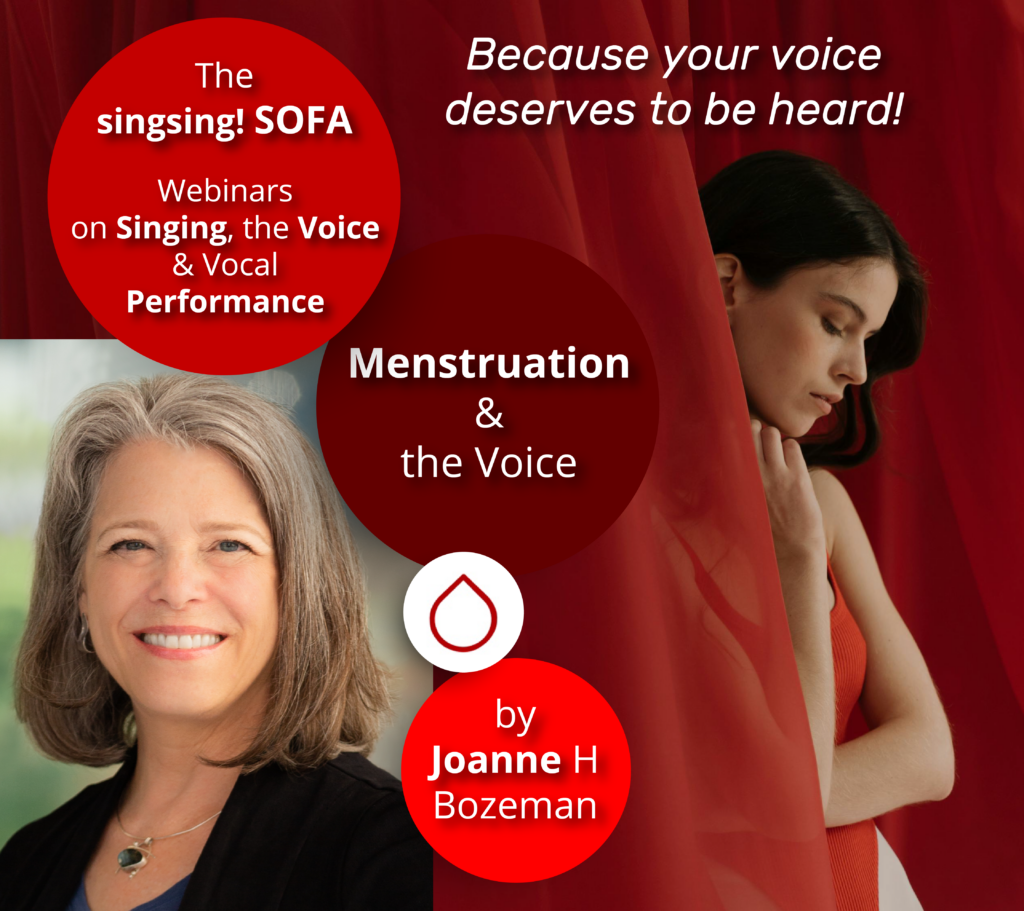
Do you sing / speak and menstruate? Or do you teach people who menstruate? Then this webinar (recorded in april ’24) is for you!
Why in past centuries were singers in Europe excused from performing around the time of their periods? When did scientific research explain the link between the menstrual cycle and the larynx? This webinar will overview the history and interactions of sex steroid hormones, the menstrual cycle and the voice, and will help you understand the “ins and outs” of your voice throughout the monthly cycle.
Joanne Bozeman has been a singing teacher for nearly 50 years. In 1993, she joined the faculty of Lawrence University’s Conservatory of Music in Wisconsin, where she taught singing and a number of voice-related, diction and music education courses until her retirement in 2019.
In addition to her career as a singing teacher, Joanne was an actively performing soprano, and she served voice trainer for the Lawrence Community Girl Choir program.
 Inspired by her long-standing interest in voice health and the relationship of hormones with voice throughout the female lifespan, Joanne co-authored the book Singing Through Change: Women’s Voices in Midlife, Menopause, and Beyond, released in 2020. She has spoken on the subject of female voice and hormones for many organizations.
Inspired by her long-standing interest in voice health and the relationship of hormones with voice throughout the female lifespan, Joanne co-authored the book Singing Through Change: Women’s Voices in Midlife, Menopause, and Beyond, released in 2020. She has spoken on the subject of female voice and hormones for many organizations.
Joanne serves as a course tutor and specialist with the Voice Care Centre in Great Britain, and is co-author of a chapter on female voice and hormones in the forthcoming Oxford Handbook of Voice Pedagogy.
As a young mother, Joanne was a certified prenatal and childbirth educator, which formed the foundation of her lifelong passion for health advocacy for women, and of her interest in the effects of the hormonal landscape on female singing voice.

So much of the women's health issues discussed are relevant and things that my singer friends and I talk about and have questions about!
Megan Pfeiffer Miller, MM, Soprano and Voice Teacher
Megan Pfeiffer Miller, MM, Soprano and Voice Teacher

Vocal Health Education: Dr. Jenevora Williams interviews Sarah Algoet on Extreme vocals
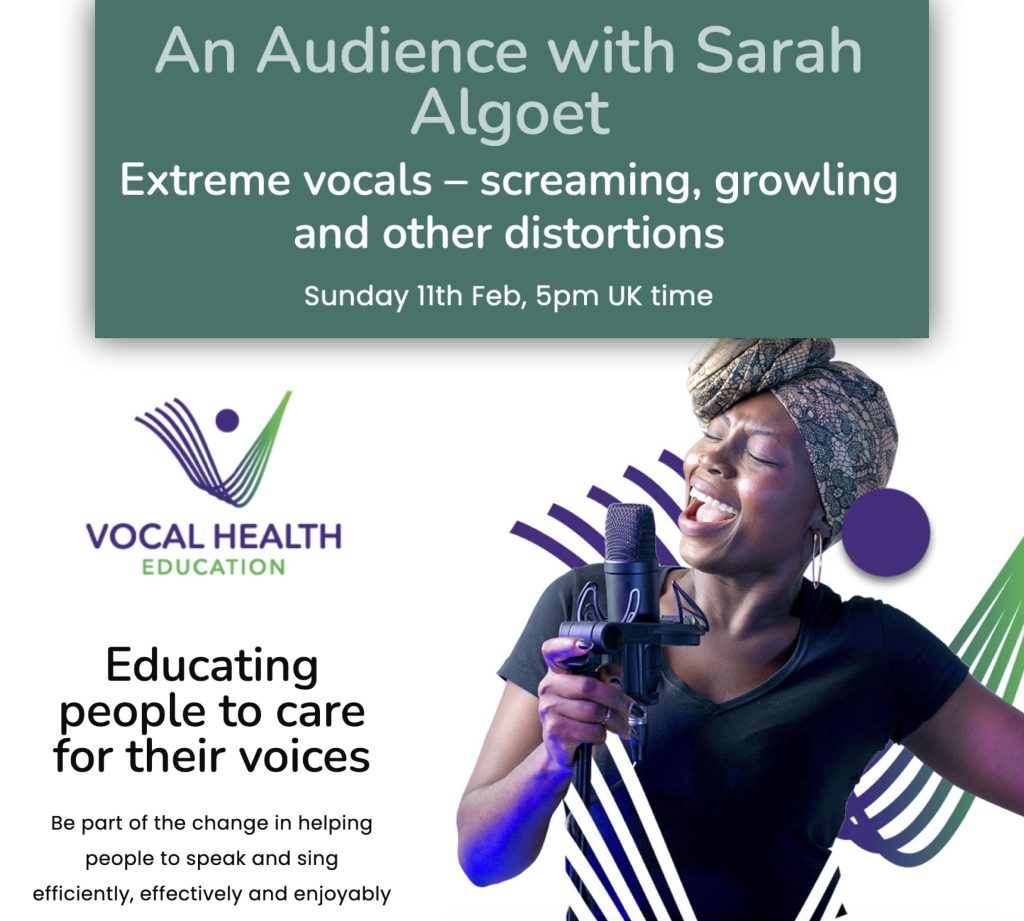
Vocal Health Education was started by Stephen King and Dr Jenevora Williams. They provide easily accessible and high-quality education in the field of vocal health and rehabilitation. They source the most exceptional specialists working in the field of voice health from around the world, and bring them right to you.
In February 2024, Dr. Jenevora Williams has interviewed me on the Extreme Vocal Effects for VHE. It was such an interesting conversation which ended up being quite interactive!
Read the feedback from Vocal Health Education and watch a little preview 👉🏼
Acceptance & Commitment Training for Improved Mental Health & Enhanced Performances by Dr. David Juncos
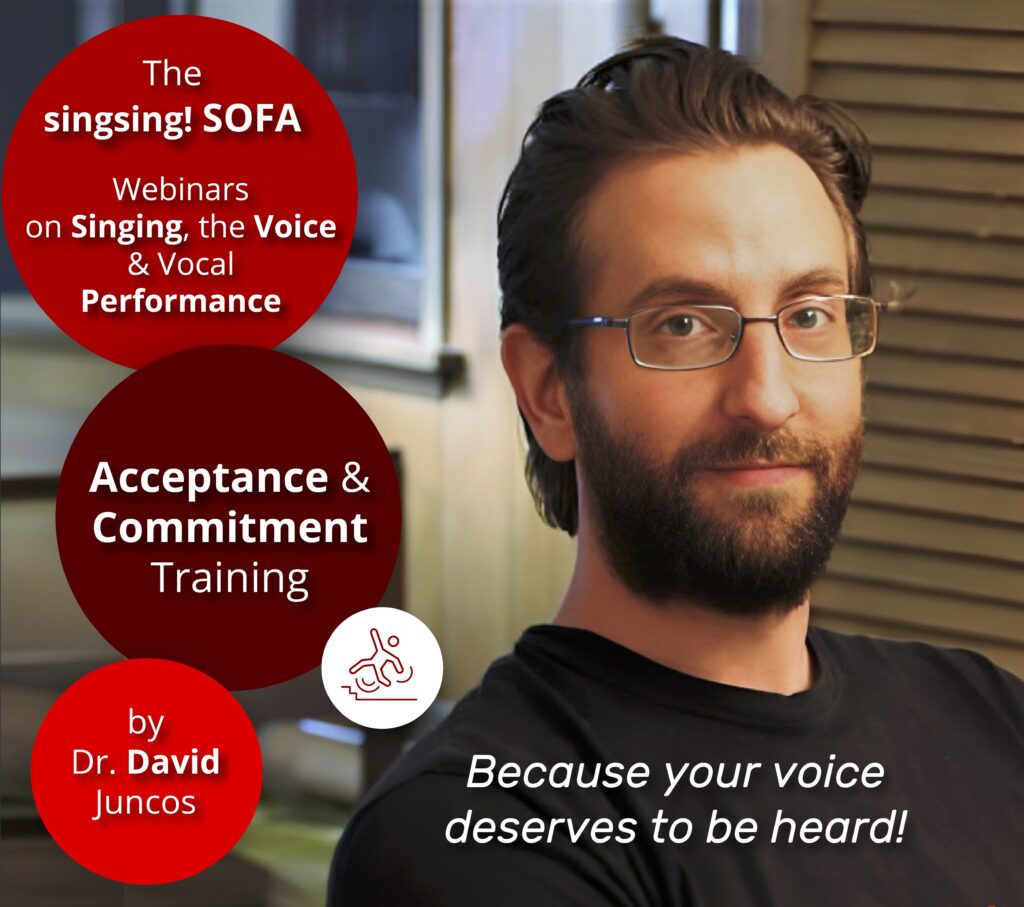
Do you have trouble with:
… Performance anxiety getting in the way of your artistic growth?
… General anxiety affecting your mental health, career and / or personal life?
… Burnout erasing your energy to execute your plans?
Do you want to learn to:
… Deal with your anxious convictions and destructive inner voice?
… Commit to necessary actions that will help your reach your goals?
… Be in touch with your personal values?
Then I highly recommed this 1,5h webinar on Acceptance and Commitment Training – ACT (recorded in September ’23)!
You will learn how to use skills from ACT to achieve peak performance for yourself (or your students). You’ll first receive a brief introduction to ACT, an evidence-based psychotherapy & coaching model that aims to teach psychological flexibility, through promoting mindfulness and acceptance of one’s symptoms of emotional distress, while also identifying & committing to actions consistent with one’s values. After the intro, we had a very interesting Q&A.
David Juncos, PsyD is a clinical psychologist and performance coach with Hornstein, Platt & Associates, Counseling and Wellness Centers, in Philadelphia, PA. He earned his doctorate in Clinical Psychology from La Salle University in 2015.
He has over 15 years experience in treating a variety of clinical problems, including anxiety, mood, and substance use disorders. He specializes in the treatment of music performance anxiety (MPA) and has presented internationally on his research in using Acceptance and Commitment Therapy (ACT) to treat MPA and enhance music performance.
He also is on faculty with the Voice Study Centre, where he provides lectures and tutorials on MPA and quantitative research, ACT, Motivational Interviewing, peak performance, and he trains music teachers in a non-clinical version of ACT to help them manage students’ MPA.
 His book, ACT for Musicians: A Guide for Using Acceptance and Commitment Training to Enhance Performance, Overcome Performance Anxiety, and Improve Well-Being, has been published in 2022 with Universal Publishers.
His book, ACT for Musicians: A Guide for Using Acceptance and Commitment Training to Enhance Performance, Overcome Performance Anxiety, and Improve Well-Being, has been published in 2022 with Universal Publishers.
In it, he and co-author Elvire de Paiva e Pona, MA, provide readers with numerous ACT-based techniques for help in managing MPA, enhancing performance, and addressing other common problems facing musicians, such as chronic pain, injury recovery, perfectionism, procrastination, shame, occupational burnout and career uncertainty.

Marie Valembois - Vocational Singer
Marie Valembois - Vocational Singer


Marie Valembois - Vocational Singer
Marie Valembois - Vocational Singer

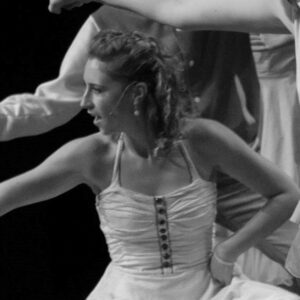
I discovered values I was not fully consciously aware of and what singing and performing actually mean to me. I strongly believe this method will add extra layers of mildness, joy and a much clearer view on my purposes. I can’t wait to discover more!
Kelly Van Hove - Entertrainer focused on Soft HR & communication workshops / Vocational Musical Theatre Singer
Kelly Van Hove - Entertrainer focused on Soft HR & communication workshops / Vocational Musical Theatre Singer

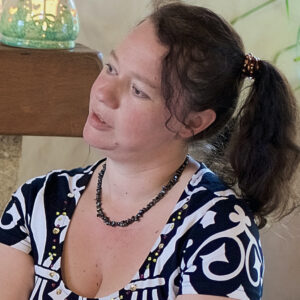
Katrin - Professional Speaker & Relationship Therapist
Katrin - Professional Speaker & Relationship Therapist
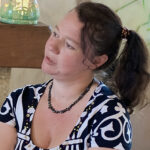

Gemma Milburn - UK based Singer and Vocal Coach
Gemma Milburn - UK based Singer and Vocal Coach

Microphone Technique & More by Beo Van Haver & Sarah Algoet
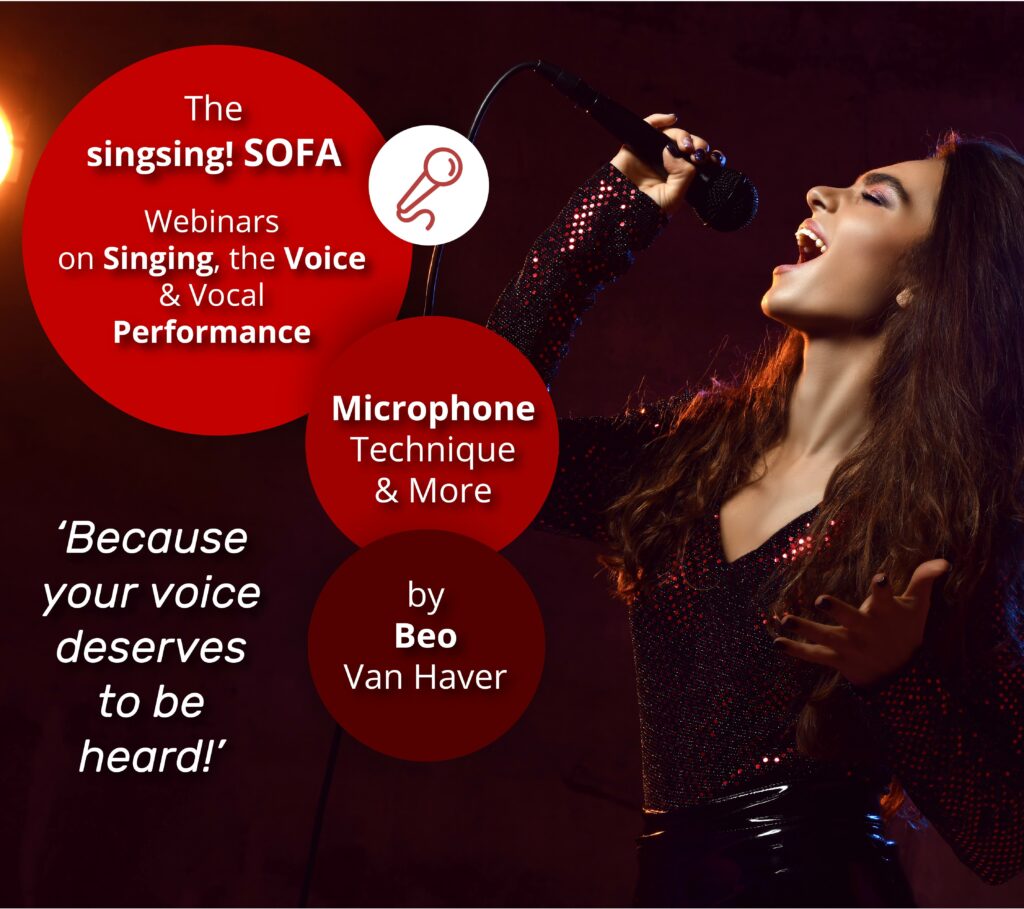
I dare to say that 50% of your sound is determined by the microphone you’re singing through, what you do with it, and everything that happens after, like equalizing, compression, reverb, delay, what the sound engineer is doing from behind the mixer,…
- Do you want to learn how to use your microphone functionally?
- Are you looking to understand the essential technicalities?
- Do you need to know how to create a sound that suits your artistic identity?
- Do you want to effectively communicate what you need to the sound engineer(s)?
Then this webinar (recorded in June ’23) is for you!
 These topics will be covered:
These topics will be covered:
- Microphones & what to do with them
- Equalizing
- Compression
- Effects (Delay & Reverb)
- And so much more!
After this webinar, you will understand how to maximize and enhance your vocal performance:
- You will do justice to your voice by choosing the right microphone and knowing how to use it.
- You will have discovered the infinite possibilities of the gear you use… and the pitfalls
- You will understand how to design your personal sound.
- You will be able to communicate to the sound engineer(s) what you want and need, during the sound check AND during the performance.
I share all the practical tips & tricks you need and Beo Van Haver explains the more technical side of things.
Beo Van Haver is a well-respected Belgian sound engineer that has toured with Gabriel Rios, Arno, Arsenal, Gorki and Bløf, among others.

Peter Smaal - Organizer of Top 2000 Nijmegen
Peter Smaal - Organizer of Top 2000 Nijmegen

Tongue Tie in Singers by Jessica Luffey
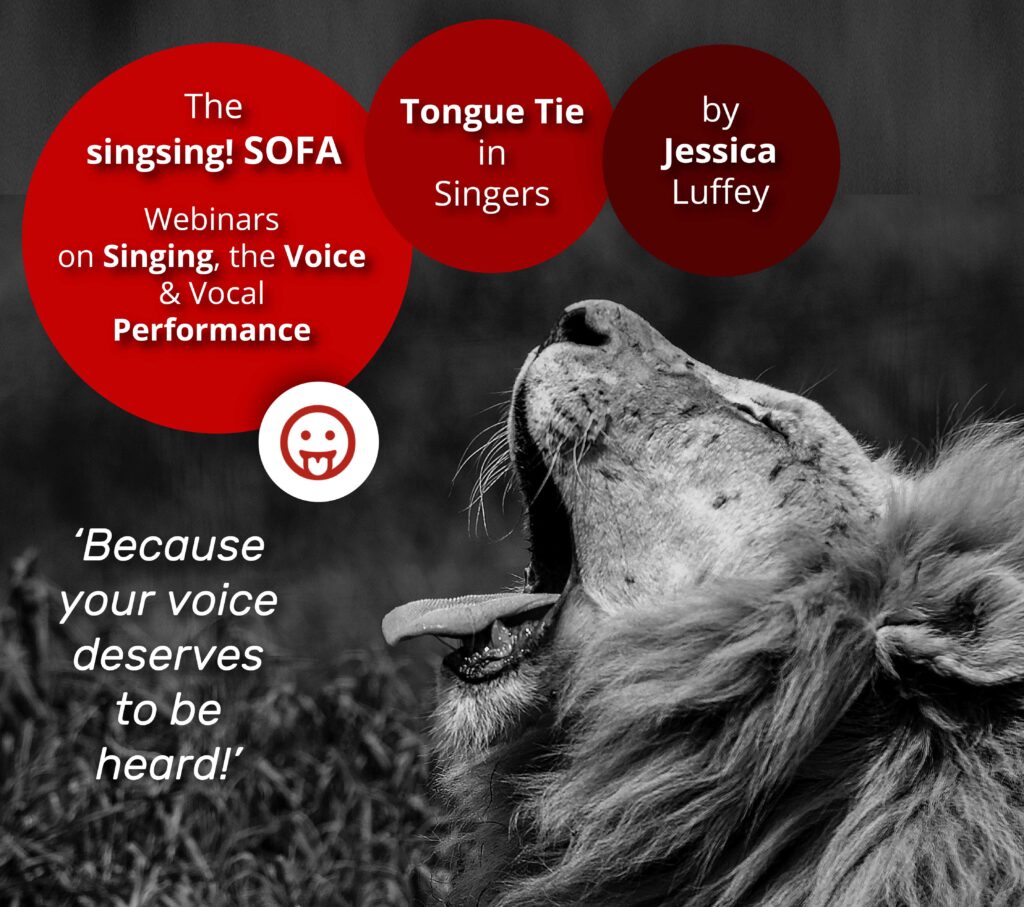
Do you have trouble with headaches, jaw tension, neck pain and / or fatigue after singing? Is it difficult to sing high notes and / or switch registers? Are you unable to control and / or relax your tongue?
Are you anxious to learn to get clarity of vowels, because your articulation is sometimes slow and sluggish? Do you want to understand how to sing with a relaxed vibrato? Do you want to find ease in singing, because now it feels like a juggling act of techniques?
This webinar (recorded in June ’23) might be the answer to your question why certain vocal tasks are very challenging for you!
As many as 25% of the population may have a tongue or lip tie. Did you know that these can have an effect on jaw tension, air management, anxiety, chronic pain AND vocal range, color and resonance?
 In this webinar, Jessica Luffey explains how tongue mobility affects breath management, the soft palate, vibrato and larynx placement and how you can eliminate tongue compensations. She also takes you through a quick assesment test to see whether you might have a tied tongue and /or lip.
In this webinar, Jessica Luffey explains how tongue mobility affects breath management, the soft palate, vibrato and larynx placement and how you can eliminate tongue compensations. She also takes you through a quick assesment test to see whether you might have a tied tongue and /or lip.
While pursuing a career as a professional opera singer, Jessica found the world of myology and since then has used her unique set of skills and insights to bridge new ideas between the two worlds. Her extensive practical myo education includes over being trained by the world’s top myo, dental/ortho, and tongue tie experts, authors, and educationalists including Dr. Zaghi, Dr. Baxter, Dr. Micheal Gelb & associates, among others. Her expertise and work has even been featured directly in Dr. Baxter’s blog.
Performance Psychology by prof. Bert De Cuyper
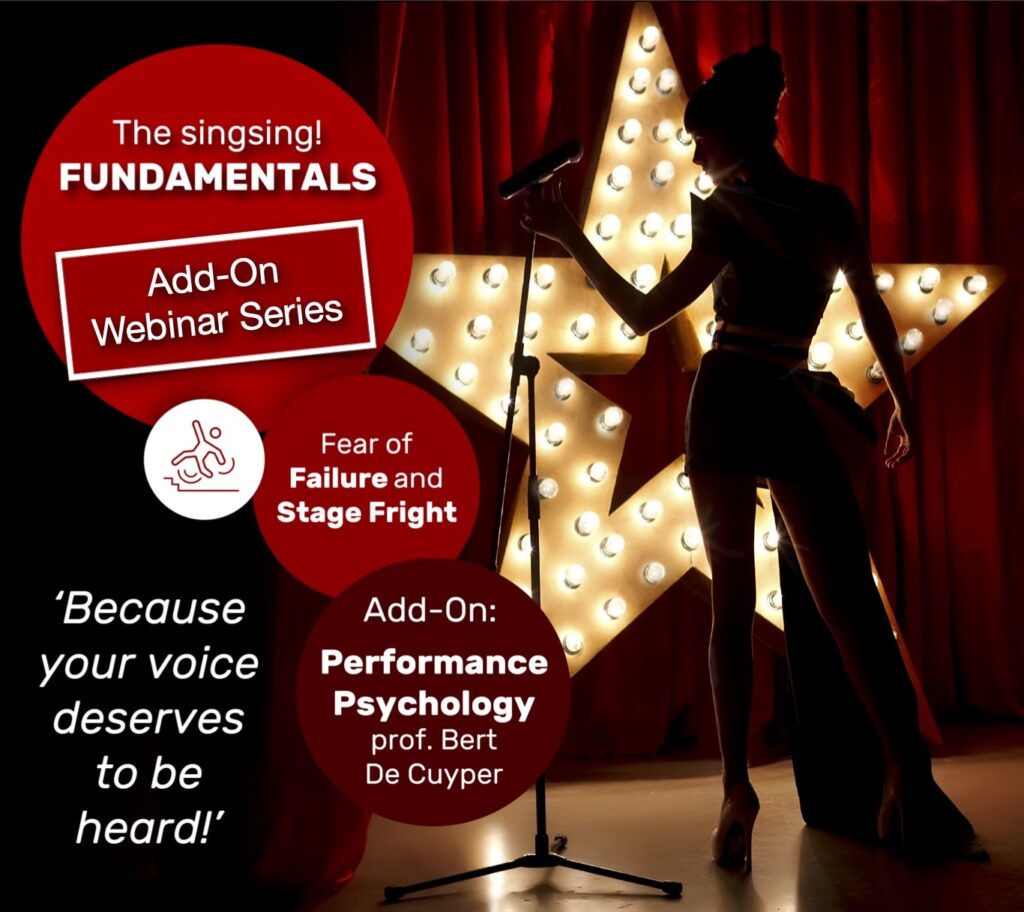
Do you want to be able to perform optimally at the moments that really matter to you? Are you looking to strengthen your mental skills through tools such as self-talk and imagery? Do you want to learn to deal with internal performance inhibitors such as loss of focus during practice sessions, pressure of expectations at performances, or negative thoughts? Then this webinar (recorded in May ’23) is for you!
Singers are vocal athletes who deliver peak performances. Being guided by a performance psychologist or performance coach should therefore be self-evident, just like in the world of sports. Unfortunately this is not the case! Many musicians don’t even realize that such help exists…
 Bert De Cuyper is emeritus professor of sports psychology at KU Leuven and guest lecturer at LUCA Campus Lemmens. He is the author of several books on communication and emotion management in (elite) sports and has more than 30 years of experience in mental coaching of elite athletes.
Bert De Cuyper is emeritus professor of sports psychology at KU Leuven and guest lecturer at LUCA Campus Lemmens. He is the author of several books on communication and emotion management in (elite) sports and has more than 30 years of experience in mental coaching of elite athletes.
In 2012 he wrote The Psychology of the Elite Athlete – From Athletics to Swimming, From Attention to Black Hole. I was immediately a fan, given the many links with the needs of the singers I work with.
In 2021, Bert wrote down these many links in the book Making music is elite sports – Performance Psychology for musicians on and off stage, together with Griet Baert and Linde Verjans.
After this webinar…
- You will be able to better map yourself as a performer through self-reflection.
- You will discover which dysfunctional thoughts are blocking you and how you can best deal with them.
- You will understand which emotions you can adjust and how.
- You will be stimulated to unlearn certain habits and to learn new behaviours, in order to practice more effectively and perform better.
This lecture is in Dutch, with English subtitles and slides.

Kaat Arnaert, Singer, Actress & Drama teacher
Kaat Arnaert, Singer, Actress & Drama teacher

The Extreme Vocal Effects by Sarah Algoet
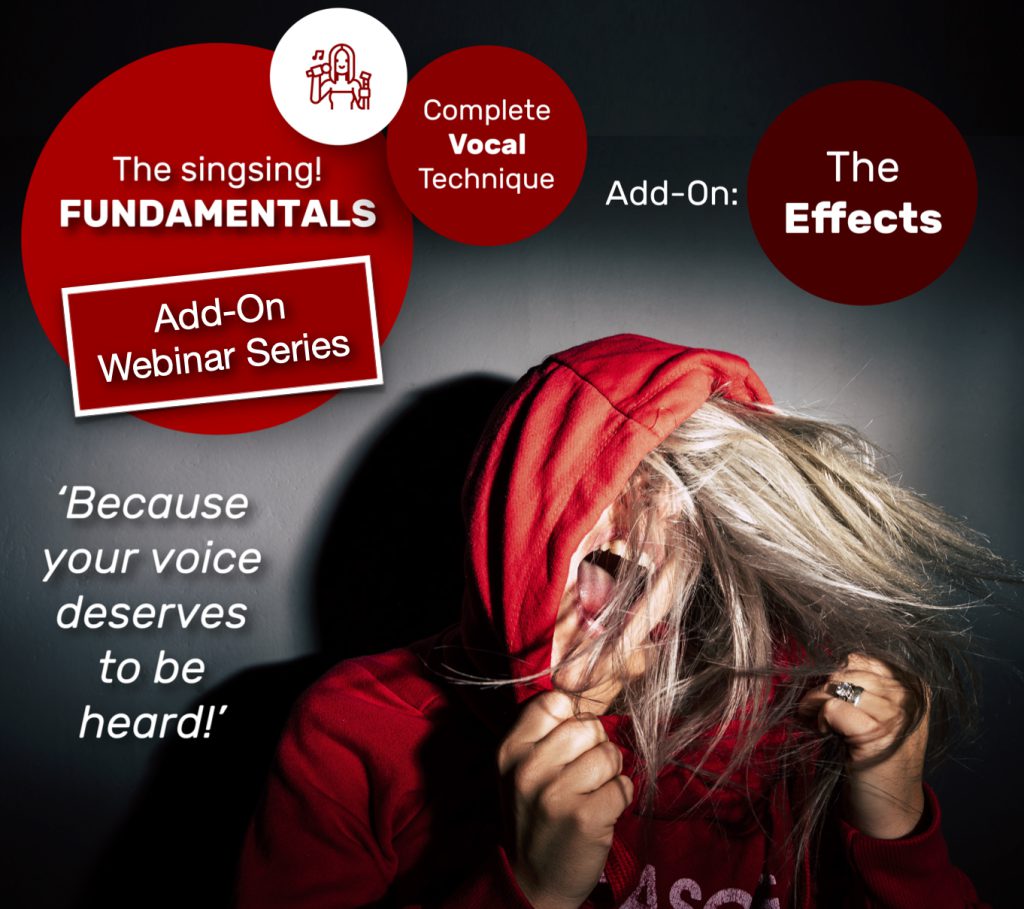
In this Add-on webinar (recorded in August ’22), you’ll receive an introduction into the wondrous world of the extreme vocal effects. Learn to use distortion, grunt, growl, pig squeals and much more extreme sounds healthily!
I use the terminology and explanation of Complete Vocal Technique as a basis, but also include terminology and explanations from other methods / models / points of view / … in order to avoid confusion and propagate an open approach.
This Add-on Webinar will teach you a lot by itself, but it could also be the perfect *next step* after the 3 initial webinars on Complete Vocal Technique from The singsing! Fundamentals.
All extreme vocal effects are created on top of a solid foundation of basic vocal technique, so one needs to be an advanced singer to be able to apply them healthily. But don’t get me wrong: Everybody can learn how to do them!
I guide you through strategies for performing different extreme vocal effects such as growl, rattle, distortion, pig squeals, fry screams and much more, as well as strategies for overcoming any challenges that these effects may present.

I now feel feel relaxed, progressed and knowledgable. I’m going to see if I can implement it into some of my musical theatre rep where appropriate and use it for pop/rock auditions.
Ashleigh Stevens, Musical Theatre Singer
Ashleigh Stevens, Musical Theatre Singer

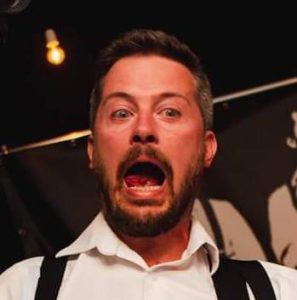
Kenneth Ottoy, Singer of Plagiaat & Piron
Kenneth Ottoy, Singer of Plagiaat & Piron


Susanna Olsen, Singer & Dancer
Susanna Olsen, Singer & Dancer


Kenneth Ottoy, Singer of Plagiaat & Piron
Kenneth Ottoy, Singer of Plagiaat & Piron


Diane Speirs - Singer & Voice Teacher
Diane Speirs - Singer & Voice Teacher


Lorna Moore, MA, Bmus, LRSL, BAST, LLCM, ALCM - Singer, Musical Director, Choir Director, Vocal Coach & Lecturer
Lorna Moore, MA, Bmus, LRSL, BAST, LLCM, ALCM - Singer, Musical Director, Choir Director, Vocal Coach & Lecturer


(2 years later) I can confirm I did go on to use those vocal techniques in shows onboard!
Emiglia Monica, Singer
Emiglia Monica, Singer


Dr. Leigh Usilton, DMA - Voice Teacher and Singer
Dr. Leigh Usilton, DMA - Voice Teacher and Singer

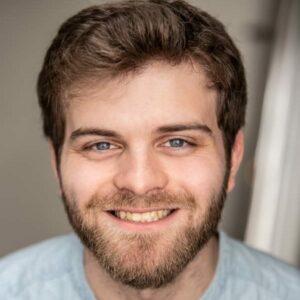
Thanks!
Adam Stickler, Musical Theatre Singer
Adam Stickler, Musical Theatre Singer
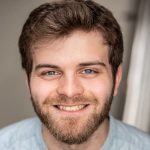

Grace Gardner, Musical Theatre Singer
Grace Gardner, Musical Theatre Singer

Brain Friendly Strategies in the Voice Studio by Sarah Algoet
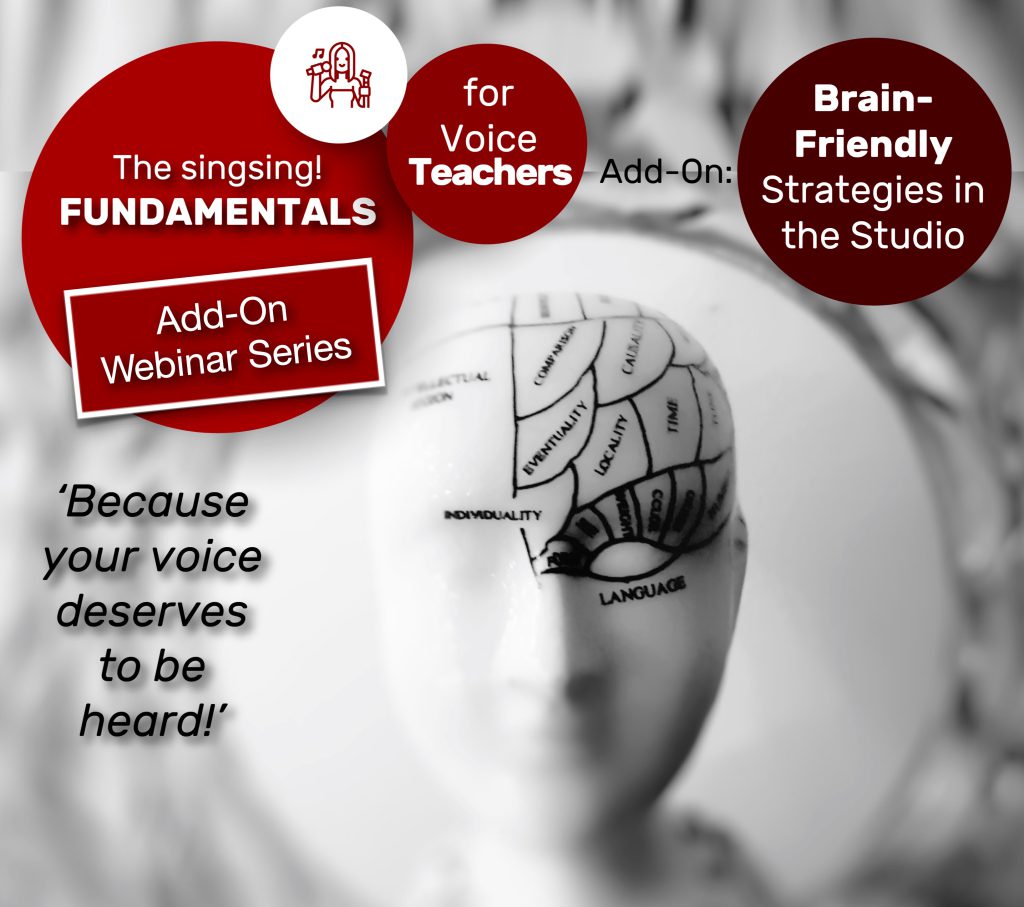
Discover how integrating playful exploration in your lessons can help you to achieve faster and more effective results with your voice students.
In 2021, the Voice Clinic of AZ Delta has invited me to present a lecture on Specific Problems in the Singing Voice for their symposium. I happily accepted, but had some issues with the word “problems” in the proposed title. In the end, this frustration turned into inspiration, and I created this lecture on how we, as teachers / coaches can help singers to learn in the most effective way, based on the most recent insights on motor-learning, with the case study of Sofie as a red thread.
Key concepts of this lecture:
- The principles of motor-learning
- The similarities & differences between singers, instrumentalists and elite athletes.
- Pros & cons of 5 different strategies and how to apply them in the voice studio: Auditive, Kinesthetic, Imaginative, Logical & Visual
This lecture is in Dutch, with English subtitles and slides.













